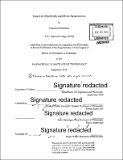Issues in objectivity and mind-dependence
Author(s)
Botchkina, Ekaterin
DownloadFull printable version (7.168Mb)
Other Contributors
Massachusetts Institute of Technology. Department of Linguistics and Philosophy.
Advisor
Stephen Yablo and Sally Haslanger.
Terms of use
Metadata
Show full item recordAbstract
Reality and objectivity are often characterized in terms of independence from the mind: the first-pass idea is that what it takes for any particular subject matter to be real and objective is for facts about it to obtain independently of beliefs, linguistic practices, conceptual schemes, and so on. But if we take seriously the possibility that significant realms of reality, including social kinds, judgment-dependent properties, and mental phenomena themselves, stand in various dependence relations to the mental, then this first-pass characterization needs to be significantly revised. In this set of papers, I consider the special questions that metaphysically mind-dependent entities raise for issues of objectivity and realism. In Part 1, 1 substantiate the notion of metaphysical mind-dependence with a taxonomy of the various ways in which entities can stand in metaphysical relations of dependence to mental phenomena. In Part II, I address the question of realism and mind-dependence: I argue that while certain entities stand in relations of significant, direct, and essential dependence on mental activity, they are nevertheless fully real. In making the argument, I elaborate a distinction between enactive and essential dependence on mental phenomena, arguing that both kinds of dependence may obtain without impinging on an entity's reality. In Part III, I address the question of objectivity and mind-dependence: I argue that certain kinds of mind-dependence, in particular, dependence on judgments, have the effect of undermining the objectivity of the relevant domain. One consequence of the view I develop is that the objectivity of a subject matter can come apart from the reality of its associated entities; another is that objectivity is a feature that is relative, rather than absolute, and depends crucially on which perspectives are brought to bear for the purposes of evaluation.
Description
Thesis: Ph. D., Massachusetts Institute of Technology, Department of Linguistics and Philosophy, 2016. Cataloged from PDF version of thesis. Includes bibliographical references (pages 90-93).
Date issued
2016Department
Massachusetts Institute of Technology. Department of Linguistics and PhilosophyPublisher
Massachusetts Institute of Technology
Keywords
Linguistics and Philosophy.